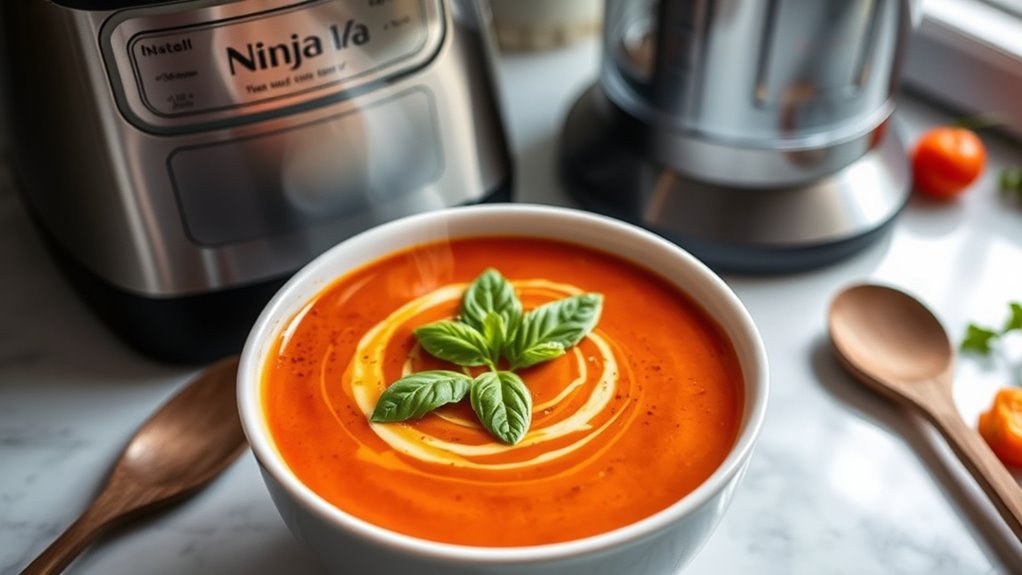Ninja Foodi soup recipes marshal quick, flavorful meals by layering aromatics, stock, proteins, and vegetables in a single pot. Start by sautéing aromatics, then add your base stock, followed by proteins and vegetables, using the appropriate pot or insert for even heat. Maintain batch consistency with the same pot quantity, monitor pressure release, and adjust timing for tenderness. Pre-measure spices and keep equipment ready for clean, safe handling. Ready to optimize flavors further as you continue.
Ingredients and Quantity
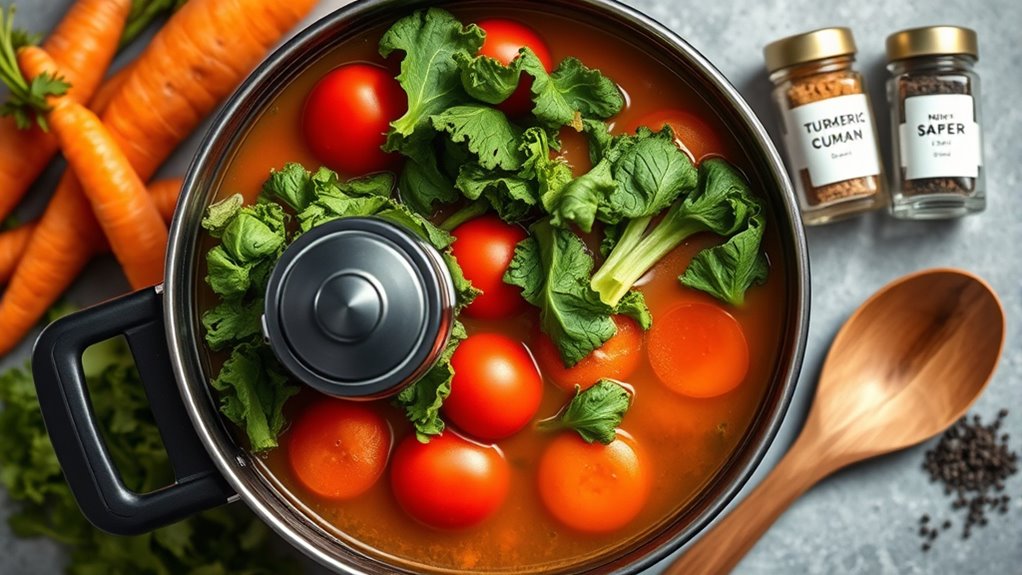
For Ninja Foodi soup recipes, assemble all ingredients with precise quantities before you start. You’ll set a firm baseline, then adjust to taste without losing control of the process. This section locks in soup bases and fresh herbs as core pillars, ensuring consistent flavor foundation and aroma. Follow measured steps to minimize waste while maximizing yield and clarity of the stock. Precision in weights, volumes, and timing safeguards reproducibility across cooks and appliances.
| Ingredient | Quantity | Notes |
|---|---|---|
| Soup bases | 1 cup | Concentrated or stock base |
| Fresh herbs | 2 tbsp | Chopped finely |
| Vegetables | 2 cups | Diced |
| Protein | 1 cup | Shredded or cubed |
| Seasoning | 1 tsp | Salt or blend |
This framework empowers you to execute with confidence and autonomy.
Preparations
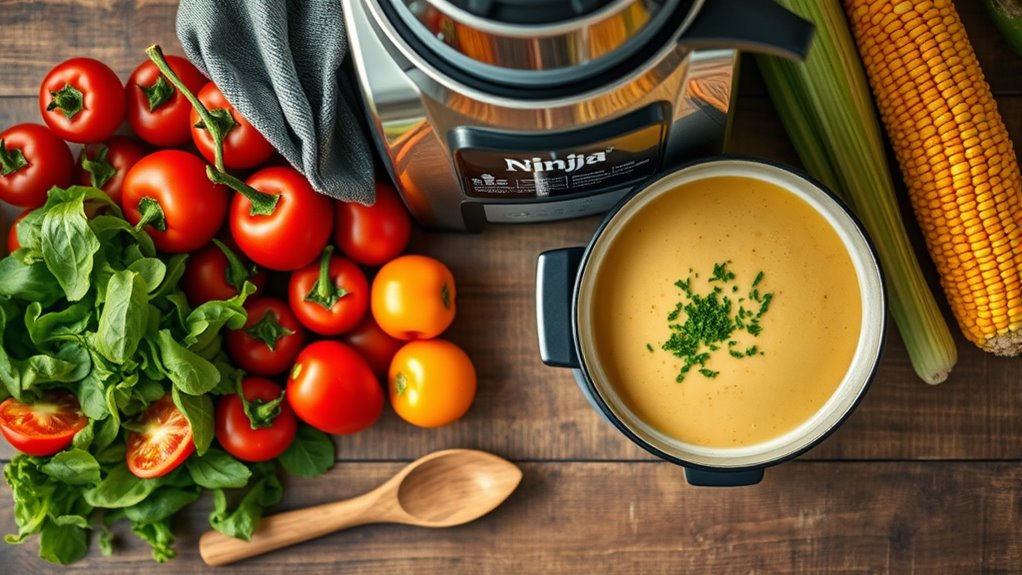
Preparations are about getting everything ready and within reach before you start cooking. You’ll organize ingredients, equipment, and timelines to prevent delays. Confirm you have all items for the Ninja Foodi, including lids, inserts, and sealing rings, plus fresh produce and stocked pantry basics. Set up a clean, dry workspace and designate a workstation for chopping, measuring, and tasting. Pre-measure spices, broth, and seasonings into labeled bowls to streamline assembly. Establish safety steps: release pressure properly, handle hot surfaces with care, and sanitize as needed. Plan for soup variations by aligning ingredients to target textures and cook times. Consider flavor enhancements like aromatics and umami boosters, ensuring precise additions at each stage to maintain consistency and control.
Kitchen tools or Kitchenware Required
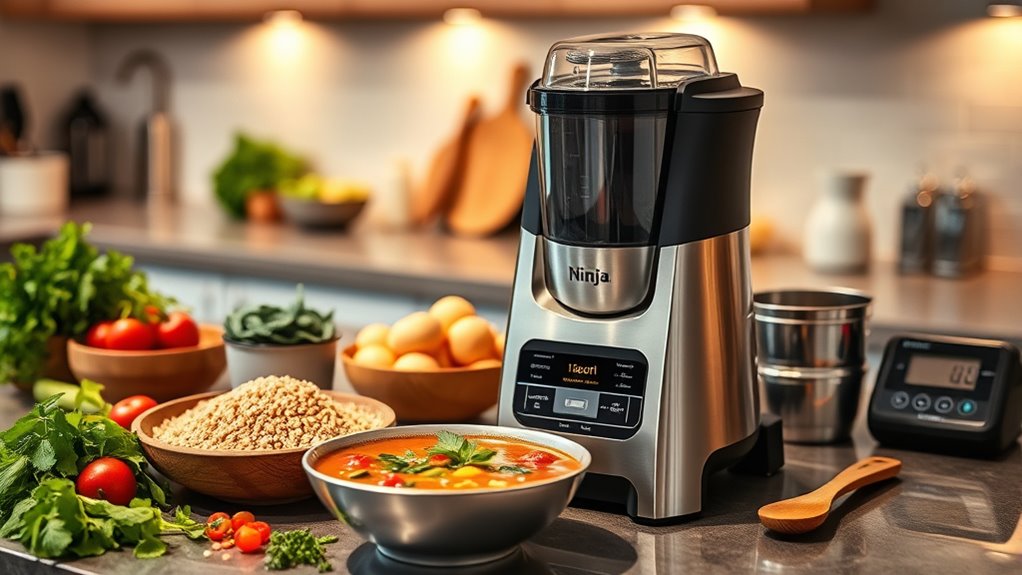
To prepare Ninja Foodi soups efficiently, you’ll need a core set of kitchen tools and kitchenware that pair with the appliance’s functions. You’ll prioritize sturdy cookware, heatproof utensils, and reliable measuring tools to maintain consistency and speed. Essential kitchenware includes a quality stock pot, a programmable inner pot if available, a silicone spatula, a ladle, a colander, a thermometer, and an accurate kitchen scale. Ninja Foodi accessories—like steamer racks and sealing rings—enhance versatility and seal in flavor. Table shows key pairings:
| Tool category | Purpose | Benefit |
|---|---|---|
| Stock pot | simmering | even heat distribution |
| Silicone spatula | stirring | avoids scratching |
| Thermometer | temp control | precise safety |
This setup supports efficient, freedom-driven cooking without clutter.
How to Cook
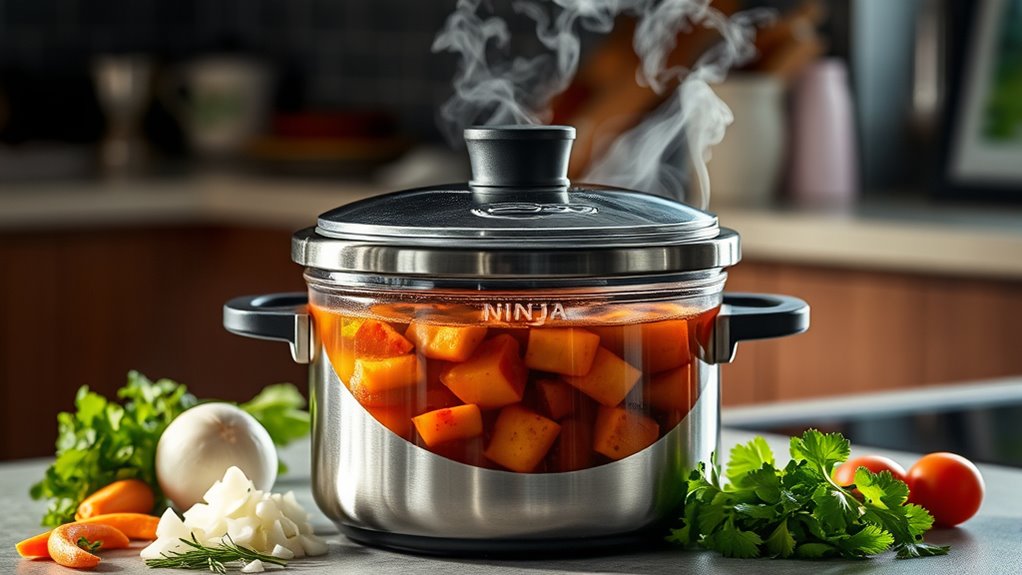
- Select a base for your soup.
- Use the Ninja Foodi’s Sauté or Browning function to seal in aromas.
- Maintain batch consistency by using the same pot quantity each time.
- Keep a steady simmer on low pressure or low heat, depending on your model.
- Build flavor in layers:
- Sauté aromatics first.
- Add stock, proteins, and vegetables.
- Adjust seasoning with salt, pepper, and umami boosters.
- Use precise timing:
- Proteins cook quickly.
- Vegetables vary by size.
- Monitor pressure release and temperature to avoid overcooking.
- Document trusted cooking techniques for consistent future results.
- Enhance flavor through mindful reductions, finishing herbs, and controlled heat rather than excessive seasonings.
How to Serve
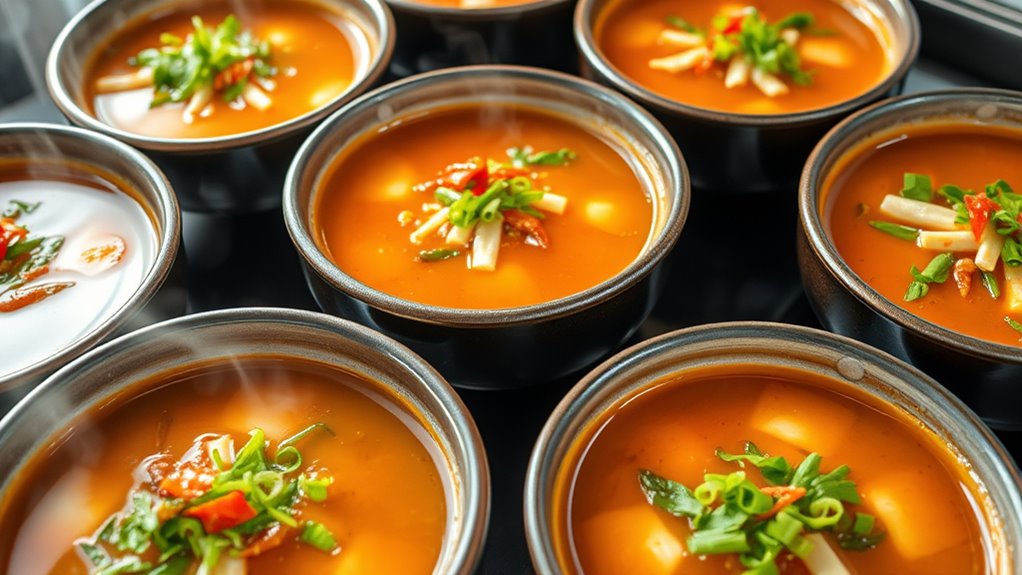
After you’ve cooked your soup, portion it evenly and keep it hot until serving. You’ll present with focus and precision, following practical serving steps that respect texture and aroma. Consider garnish options that add color, contrast, and aroma without masking flavor. Maintain appropriate bowls and consistent ladling height to preserve heat and surface appearance. Pair serving suggestions with timing that aligns toppings and broth clarity for a clean finish. Maintain a tidy station, label portions, and employ a simple garnish cadence to aid speed in service.
- Steam rising from clear broth over warm bowls
- Colorful herbs glinting above a satin surface
- Thin sliced scallions for crisp bite
- Citrus zest or a single chili curl for brightness
- Small drizzle of oil to finish, enhancing aroma
Tips
When planning Ninja Foodi soup tips, focus on timing, texture, and clarity to keep every spoonful consistent. You optimize consistency by standardizing base temps, pressure cycles, and release methods, then tailor each batch to the final texture you want. Use precise sautéing start times to build flavors without overcooking proteins or vegetables. Document exact liquid ratios and simmer durations to avoid variability across servings. For soup variations, test small pilot batches before scaling, adjusting thickness with controlled reductions or thickeners. Store seasoning tips separately from core flavors so you can refine salt, acid, and aromatics per batch. Maintain clear labeling and batch notes to guarantee repeatable results. Prioritize measurable outcomes, repeatable steps, and confident execution.
Food Value and Benefit
Ninja Foodi soups provide a convenient, nutrient-rich meal option that supports a healthy lifestyle. By combining lean proteins and fresh vegetables, these soups offer balanced nutrition with essential vitamins and minerals, all while maintaining great flavor and texture. This recipe delivers a wholesome dish that fuels your body, promotes satiety, and helps you manage portion sizes effectively.
Benefits of eating this recipe include:
- Fast, nutrient-dense meals packed with vitamins A, C, and K, as well as minerals like potassium and iron
- Consistent textures that help reduce overeating and support digestion
- Balanced combination of lean protein and vegetables for sustained energy and muscle maintenance
- Lower sodium content without compromising taste, promoting heart health
- Clear ingredient transparency to aid informed nutritional choices
- Preservation of nutrients through efficient cooking methods, supporting immune function and overall well-being
Frequently Asked Questions
Can I Freeze Ninja Foodi Soup for Later?
Yes, you can freeze Ninja Foodi soup for later. Freeze in portions, cool first, use freezer-safe containers, and label. For best quality: follow freezing tips, then thaw safely; practice proper soup storage to preserve flavor and texture.
What’s the Best Thickener for Ninja Foodi Soup?
The best thickener is a cornstarch slurry; you can also boost body with potato flakes. You mix, heat, and whisk until glossy. You’ll gain control, precision, and freedom to adjust texture to your liking.
How Long Can I Store Leftovers in the Ninja Foodi?
Leftovers last up to 3–4 days in the fridge when properly stored. For safety, cool promptly, use airtight containers, reheat to steaming hot, and avoid leaving at room temperature. Follow food safety guidelines to preserve quality and safety.
Can I Use Bone Broth Instead of Stock?
Bone broth works fine as a substitute for stock; its benefits include richer flavor and nutrients. You’ll notice stock differences in clarity and body, but you still get bone broth benefits with similar cooking results.
Is There a Vegetarian Option for All Soups?
Yes, you can. You’ll choose vegetarian ingredients to craft stew-like bases, ensuring flavor depth. This supports soup variations that remain satisfying, even without meat, while preserving texture and nutrition you demand for flexible, meat-free menus.
References
- https://www.nutrition.gov/topics/nutrition-101/healthy-eating/recipes-and-cooking-tips
- https://www.cdc.gov/healthyweight/healthy_eating/recipes.html
- https://www.eatright.org/food/planning-and-prep/recipes
- https://www.foodbanking.org/recipes/
- https://www.choosemyplate.gov/recipes
- https://www.heart.org/en/healthy-living/healthy-eating/healthy-cooking
- https://www.nutrition.org.uk/healthyliving/recipes.html
